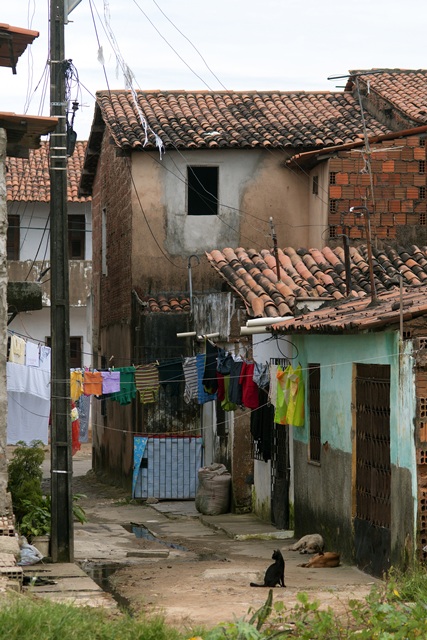
Eurasia is often thought of as having more developed housing than many other parts of the world. Recently, however, international attention has been focusing on several types of “housing poverty” in the region.
For example, in Kyrgyzstan and Tajikistan around 70% of dwellings lack a bath or a shower. In Uzbekistan, this figure is more than 80%. And in the rural parts of Kyrgyzstan, only 17% of homes have piped water.
In the EU, housing-related expenditure is the largest component of consumer spending. According to the International Union of Tenants, in 2012 it accounted for 23% of total household expenditures. For 12% of the population, it accounts for 40% of their expenditures.
In the past relatively little attention was paid to energy efficiency in construction and in heating systems. As a result, for households living in older buildings, including a majority of the poor, energy bills are now very high and many people are living in energy poverty. According to the EU Statistics on Income and Living Conditions, every tenth person in the EU lives in a household that was unable to pay its utility bills at some time during the last year.
Problems such as these prompted five international organizations to organize a second “Housing Forum: Europe and Central Asia” as a platform for decision-makers to explore solutions to housing challenges in these regions. These organizations are: Habitat for Humanity International, the International Federation of Red Cross and Red Crescent Societies, the United Nations Development Programme, the United Nations Economic Commission for Europe (UNECE) and the United Nations Human Settlements Programme (UN-HABITAT).
The Housing Forum was held from 22 to 24 April at the Palais des Nations, Geneva, Switzerland. Participants discussed ways to address housing problems, develop affordable housing solutions for the poor and bring together businesses and the public sector in order to accomplish these objectives.
In his closing statement at the Forum, Sven Alkalaj, UNECE Executive Secretary, reminded participants that over 50 million people in the UNECE region still live in informal settlements. Many homes are not sufficiently insulated. Systems for maintaining and developing homes that meet the needs of poor and vulnerable groups need to be improved. He also reiterated the UNECE’s commitment to addressing these housing challenges. He said, “I am confident, “that the outcomes of this Forum will provide an important input to the high-level discussion at the UNECE’s Ministerial meeting on housing and land management, which takes place this October, where Ministers from throughout the region will set policy and discuss how they can work to resolve housing and land management challenges”.
More information on the second Housing Forum: Europe and Central Asia can be found at http://www.unece.org/index.php?id=31595.
For any queries or additional information, please contact:
Michael Milligan
Housing and Land Management Unit
Email: [email protected]
Telephone: +41 (0)22 917 1357
Note to editors
About the organizers of the Housing Forum
About Habitat for Humanity International
Habitat for Humanity International is a Christian nonprofit organization dedicated to the cause of eliminating poverty housing. Since its founding in 1976, Habitat has built and renovated more than 600,000 homes worldwide, providing simple, decent and affordable shelter for more than 3 million people. For more information, visit www.habitateurope.org.
About International Federation of Red Cross and Red Crescent Societies
The International Federation of Red Cross and Red Crescent Societies (IFRC) is the world’s largest humanitarian organization. It works to support and develop the capacities of its member National Societies around the world in their humanitarian mission to assist the most vulnerable members of society, without discrimination as to nationality, race, religious beliefs, class or political opinions. The IFRC’s work focuses on four core areas: promoting humanitarian values, disaster response, disaster preparedness, and health and community care. The IFRC is the convener of the General Shelter Cluster for natural disasters. For more information, visit www.ifrc.org.
About UNDP
The United Nations Development Programme (UNDP) is the UN’s global development network, an organization advocating for change and connecting countries to knowledge, experience and resources to help people build a better life. UNDP in Europe and the Commonwealth of Independent States is on the ground in 28 countries and territories in Central and Eastern Europe, the Caucasus and Central Asia. For more information, visit www.undp.org.
About UNECE
The United Nations Economic Commission for Europe (UNECE) is one of five regional commissions of the United Nations. It was established in 1947 by the UN Economic and Social Council. The overall mandate of the UNECE is to facilitate greater economic integration and cooperation among its fifty-six Member States and promote sustainable development and economic prosperity. For more information, visit www.unece.org.
About UN-HABITAT
The United Nations Human Settlements Programme, UN-HABITAT, is the United Nations agency for human settlements. It is mandated by the UN General Assembly to promote socially and environmentally sustainable towns and cities with the goal of providing adequate shelter for all. UN-Habitat programmes are designed to help policy-makers and local communities to get to grips with the human settlements and urban issues and find workable, lasting solutions. For more information, visit www.unhabitat.org.

